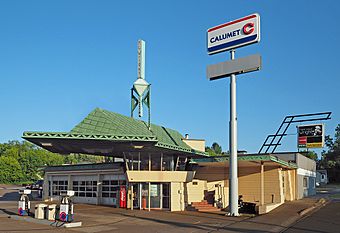R. W. Lindholm Service Station facts for kids
Quick facts for kids |
|
|
Lindholm Oil Company Service Station
|
|

The R. W. Lindholm Service Station, viewed from the northwest
|
|
| Location | 202 Cloquet Avenue, Cloquet, Minnesota |
|---|---|
| Area | less than one acre |
| Built | 1958 |
| Architect | Frank Lloyd Wright |
| NRHP reference No. | 85002202 |
| Added to NRHP | September 11, 1985 |
The R. W. Lindholm Service Station is a unique gas station in Cloquet, Minnesota, United States. It was designed by the famous architect Frank Lloyd Wright. Built in 1958, it is the only gas station Wright designed that was actually built during his lifetime.
This station was part of Wright's big plan for a perfect city called Broadacre City. It is one of the few parts of that plan that ever came to life. Today, the building is listed on the National Register of Historic Places because of its special design.
History of the Lindholm Station
Frank Lloyd Wright designed a house for the station owner, Ray Lindholm, in 1952. Wright knew Lindholm worked with oil. So, he suggested designing a gas station that would fit into his Broadacre City idea.
Lindholm liked the idea of making gas stations more beautiful. Wright finished his design in 1956. The station cost about $20,000 to build. This was about four times more than a typical gas station at that time.
The station opened in 1958 under Lindholm's name. Later, it became a Phillips 66 station.
Wright hoped the gas station would become a community meeting place. This idea didn't really happen. However, Phillips 66 did use some of Wright's design ideas in their future stations. They especially liked the triangular roof that sticks out.
The station was added to the National Register of Historic Places on September 11, 1985. This was because of its important and unique architecture. As of 2014, the station operates under the Spur brand.
Special Design Features
In his plans for Broadacre City, Wright imagined service stations as important social centers. The Lindholm Service Station shows these ideas. It has a very different look compared to other gas stations of its time.
A large cantilevered copper roof extends over the gas pumps. This means the roof sticks out without needing pillars underneath. The pointy end of the roof points towards the St. Louis River. Wright wanted this to connect river travel with car travel.
Wright also wanted to hang the gas pumps from the roof. This would have made more space on the ground. But local safety rules made him use regular ground-based pumps instead.
Under the big roof, there is a glass-walled lounge. This was meant to be the social hub Wright dreamed of. The service bays, where cars are fixed, are made from stepped cement blocks. The way the blocks are laid makes the building look long and flat. Skylights in the roof let sunlight into the service bays.
Even though gas stations were important to his Broadacre City idea, this was the only one Wright saw built. Another gas station he designed in 1927 was finally built in 2013. It is now part of the Pierce-Arrow Museum in Buffalo, New York.
Further Reading
- Storrer, William Allin. The Frank Lloyd Wright Companion. University Of Chicago Press, 2006, ISBN: 0-226-77621-2 (S.414)
See also
 In Spanish: Estación de servicio R. W. Lindholm para niños
In Spanish: Estación de servicio R. W. Lindholm para niños
 | Frances Mary Albrier |
 | Whitney Young |
 | Muhammad Ali |



